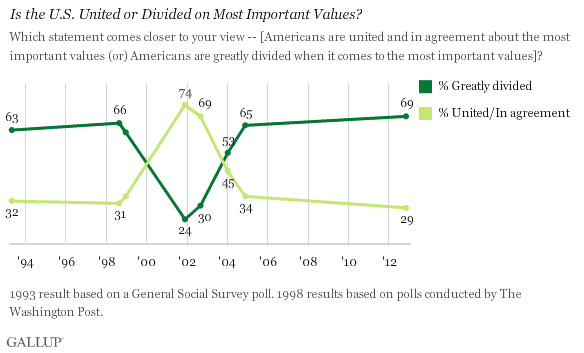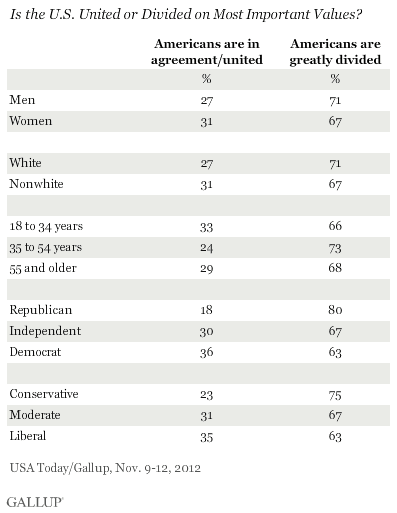PRINCETON, NJ -- As federal lawmakers and the U.S. president struggle to bridge their philosophical differences and reach a budget compromise before the end of the calendar year, the public broadly perceives that Americans themselves are divided over core values. Nearly seven in 10 Americans say the country is divided when it comes to the most important values, while 29% believe Americans are largely in agreement and united.

Gallup first asked this question in November 2001, when -- less than three months after the 9/11 terrorist attacks -- 74% said Americans were in agreement on core values. Perceptions of consensus remained high a year later, but slipped to 45% by January 2004 and to 34% by November 2004.
The perception that the country is divided over values is not new, however. Polls sponsored by the General Social Survey and The Washington Post between 1993 and 1998 found views similar to those of today, with more than six in 10 Americans then saying the country was divided over values, versus roughly a third saying it was united.
Republicans, Conservatives Are Most Likely to Perceive Division on Values
Americans' views about the nation's agreement on values are largely uniform across societal subgroups, including by race, gender, and age. More significant differences are seen on the basis of politics, with Republicans and conservatives expressing the most skepticism about the country's being united. Still, majorities of all political and ideological groups say the country is divided.

Bottom Line
Although in the first year or so after the 9/11 attacks, Gallup recorded a surge in the view that Americans are united on values, polling since 1993 has typically found the great majority of Americans saying the country is divided on the most important values. The 69% saying this today is slightly higher than the 63% measured in 1993, but statistically similar to levels found in mid-1998 and late 2004. Moderates and liberals are more likely than conservatives to believe Americans agree on important values, although majorities of all groups believe the country is greatly divided.
The difficulty President Barack Obama and Congress are having in coming to agreement on important issues may, therefore, not be unique to Washington; rather, it may generally reflect the way things are -- or at least are perceived to be -- in the country more broadly. Whether that is a bad thing, or the natural result of the United States' large size, diversity, and freedoms that allow political arguments to go on unfettered, is a separate issue.
Survey Methods
Results for this USA Today/Gallup poll are based on telephone interviews conducted Nov. 9-12, 2012, with a random sample of 1,009 adults, aged 18 and older, living in all 50 U.S. states and the District of Columbia.
For results based on the total sample of national adults, one can say with 95% confidence that the maximum margin of sampling error is ±4 percentage points.
Interviews are conducted with respondents on landline telephones and cellular phones, with interviews conducted in Spanish for respondents who are primarily Spanish-speaking. Each sample includes a minimum quota of 400 cellphone respondents and 600 landline respondents per 1,000 national adults, with additional minimum quotas among landline respondents by region. Landline telephone numbers are chosen at random among listed telephone numbers. Cellphone numbers are selected using random-digit-dial methods. Landline respondents are chosen at random within each household on the basis of which member had the most recent birthday.
Samples are weighted by gender, age, race, Hispanic ethnicity, education, region, adults in the household, population density, and phone status (cellphone only/landline only/both, cellphone mostly, and having an unlisted landline number). Demographic weighting targets are based on the March 2011 Current Population Survey figures for the aged 18 and older U.S. population. All reported margins of sampling error include the computed design effects for weighting.
In addition to sampling error, question wording and practical difficulties in conducting surveys can introduce error or bias into the findings of public opinion polls.
View methodology, full question results, and trend data.
For more details on Gallup's polling methodology, visit www.gallup.com.
